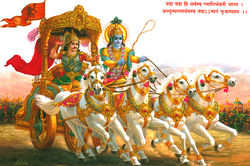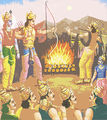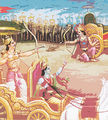Mahabharata is one of the two major Sanskrit epics of ancient India, the other being the Ramayana. The epic is part of the Hindu itihasa, the word in itself literally means "history", and forms an important part of Hindu mythology. The historicity of the Mahabharata War is not clear now. The time of the War could be the context of Iron Age India of the 9th century BC or so Regardless of the historicity of the Kurukshetra War in particular, the general setting of the epic certainly does have a historical precedent in Iron Age (Vedic) India, where the Kuru kingdom was politically powerful during roughly 1200 to 800 BC.
- The evidence of the Puranas is of two kinds. Of the first kind, there is the direct statement that there were 1015 (or 1050) years between the birth of Parikshit (Arjuna's grandson) and the accession of Mahapadma Nanda, commonly dated to 382 B.C., which would yield an estimate of about 1400 B.C. for the Bharata battle. However, this would imply improbably long reigns on average for the kings listed in the genealogies. Of the second kind are analyses of parallel genealogies in the Puranas between the times of Adhisimakrishna (Parikshita's great-grandson) and Mahapadma Nanda. Pargiter accordingly estimated 26 generations by averaging 10 different dynastic lists and, assuming 18 years for the average duration of a reign, arrived at an estimate of 850 B.C. for Adhisimakrishna, and thus approximately 950 B.C. for the Bharata battle. B. B. Lal used the same approach with a more conservative assumption of the average reign to estimate a date of 836 B.C., and correlated this with archaeological evidence from Painted Grey Ware sites, the association being strong between PGW artifacts and places mentioned in the epic.
- Mahabharata is a large epic, composed by Vyas. It is divided into eighteen books, and a supplement called Harivansh. The latter deals with the life of Krishna. Since the race of Bharat is the topic of the Mahabharat, it was first called Bharat, and then, due to its greatness, it came to be known as the Mahabharat. The substance of the Mahabharata is as follows - Shantanu a descendant of Bharat and king of Hastinapur had three sons. After the death of his second son Chitrangad, Vichitravirya, the youngest, succeeded the throne. Vichitravirya's two widows begot of Vyas two sons, Dhritrashtra and Pandu.
- Dhritrashtra being blind, Pandu ascended the throne. Later, for certain reasons, Pandu retired to the forest, where he performed penance, leaving Dhritrashtra in charge of the throne. During their stay in the forest, Pandu's two wives, Kunti and Maadri, gave birth to five sons, who were known as the Pandavs. Meanwhile, in the palace, Gandhari, wife of Dhritrashtra, gave birth to a hundred sons, who were known as the Kauravs. After the death of Pandu and Maadri in the forest, the Pandavs returned to Hastinapur with Kunti, where along with the Kauravs, they gained mastery over the Veds and the art of using weapons.
- Since the Pandavs were superior in every way to the Kauravs, the sons of Dhritrashtra began to feel jealous and tried to harm the Pandavs. Peace was finally brought about by Bhishma, the eldest son of Shantanu, and the kingdom was divided into two, with the capital of the Kauravs in Hastinapur, while the Pandavs ruled from Indraprasth. The Kauravs, still jealous, tried every means to get rid of the Pandavs. They held a game of dice, and invited the Pandavs to play. Shakuni played on behalf of the Kauravs, and defeated the Pandavs by foul play.
- As a result, the Pandavs, along with their wife Draupadi, were sent into exile for a period of thirteen years, twelve years of which would be spent in the forest and the thirteenth year incognito. After the thirteen years were over, the Pandavs returned and demanded the return of their kingdom. But Duryodhan, the eldest of the Kauravs, refused to even give a needle point of territory.
- Hence the great battle of Mahabharata took place, in which the Kauravs were defeated and the Pandavs regained their kingdom, of which Yudhishthir was crowned king. After a period of thirty-six years, the Pandavs installed their grandson Parikshit on the throne, and along with Draupadi, repaired to the forest.
Gallery
Jaydrath Vadh
Karn in Mahabharat
| ||||||||










